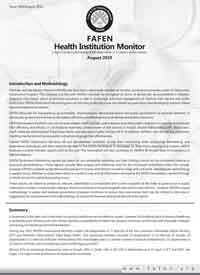A dispensary is the basic unit in the state-run primary healthcare service delivery system. However, this building block of primary healthcare is tainted by poor infrastructure, lack of basic facilities, unavailability of medicines, absence of doctors and female staff and weak oversight, warranting immediate governmental attention. During July 2010, FAFEN’s Governance Monitors visited 109 dispensaries in 77 districts of the four provinces, Islamabad Capital Territory (ICT) and Federally Administered Tribal Areas (FATA).
The monitored facilities included 52 dispensaries in 32 districts of Punjab, 15 dispensaries in 12 districts of Khyber Pakhtunkhwa (KP), nine dispensaries in a similar number of districts of Balochistan, 31 dispensaries in 22 districts of Sindh and one dispensary each in FATA Agency and ICT. Almost 42% of monitored dispensaries were in Punjab, 29% in Sindh, 16% in KP, 12% in Balochistan and 1% each in ICT and FATA. See Graph 1 for region-wise distribution of dispensaries monitored.
More than one fourth of dispensaries monitored nationwide lack proper infrastructure. Majority of them do not have basic facilities like latrines and clean drinking water supply. Around half of the dispensaries visited do not have female staff to deal with female patients. In addition, almost three fourth (76%) of dispensaries visited across the country do not have a ward and staff to deal with emergency patients. More than one fifth of patients interviewed complained that the doctor was absent on the day of FAFEN monitoring.
To download complete report, click here


